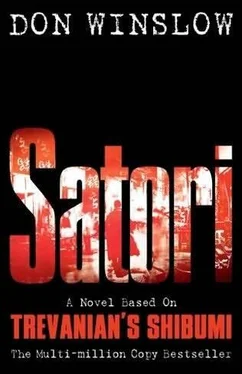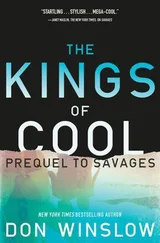He entered the park and then decided to give his followers the gift of a little variety by taking the west instead of the east path around the lake. It’s the least that I can do, he thought, for getting them up so early, and there is no scheduled dead drop on the bridge anyway.
But, he thought, what if I can kill Voroshenin without anyone noticing at all? Then I could simply get up and walk out, followed only by my Chinese handlers, whom I could then leave behind in the hutongs of Xuanwu before disappearing into the mosque.
Is it possible? he asked himself as he jogged along the lake’s edge.
Of course it is, he thought, hearing the voice of General Kishikawa. Never consider the possibility of success-consider only the impossibility of failure.
Hai, Kishikawa-sama.
He reviewed the dozens of methods that naked kill offered to dispatch an opponent from close range without undue fuss. Then he sorted them into categories based on his potential situation – sitting to the right of Voroshenin, to the left, behind him, or, a bit more difficult, if he were separated by a seat with a guard or another guest between him and his target.
Difficult, yes, but not impossible.
Only failure is impossible.
Unthinkable.
As he rounded the northern edge of the lake, Nicholai broke into a sprint to break up the boredom but mostly to see what sort of speed the Greyhound really had. It might come to that – a footrace to create space and time to lose the man in Xuanwu.
The Greyhound lived up his moniker. He accepted Nicholai’s challenge and stayed with him for the first minute or so, but then Nicholai took it up another notch, gained ground again, and noted that the Greyhound couldn’t catch up.
So it is possible, Nicholai thought as he slowed down so as not to cause his followers any undue alarm.
It is possible to do this thing and live.
Back at the hotel, he stripped off his sweaty clothes, took a quick bath in water that could only achieve tepid, dressed, and went downstairs for a spare breakfast of warm soy milk and pickled vegetables. He had been eating too much and too richly, his body felt consequently dull and slow.
Chen arrived a few minutes later. He sat down, barked an order for tea, and looked at Nicholai unhappily.
“You like to exercise,” he accused, dropping all pretense that his guest was not under constant surveillance.
“Is that a problem?”
“It is self-indulgent.”
“I had thought quite the opposite.”
Chen’s mug of tea arrived at the table. “It is self-indulgent,” he explained, “in the sense that it uses up the people’s resources that could be better spent elsewhere.”
“Such as lounging around the lobby?” Nicholai asked, wondering why it was so much fun to bait Chen.
“My men are very busy,” Chen said. “They have a lot to do.”
“Comrade Chen, I agree with you completely,” Nicholai said. “It is a total waste of precious time and resources for your men to follow me about -”
“They are not ‘following’ you,” Chen huffed, “they are ‘protecting’ you.”
“Certainly it is a waste of resources to offer protection in the new people’s society,” Nicholai observed blandly, “where crime is an anachronism that has been relegated to the imperialist past.”
“They protect you,” Chen insisted, growing more agitated, “against counterrevolutionary agents.”
“Ah,” Nicholai said. He bowed slightly. “I now realize the mistake in my thinking. Please accept my apologies for my thoughtlessness. I shall cease my morning run.”
“No,” Chen said, softening. “I just wanted to make you aware… Is that all you’re having for breakfast?”
“It was,” Nicholai answered, “but now I am thinking perhaps some steamed buns? With red bean paste?”
“Only if you want.”
“Only if you will share them with me.”
“Only to be a congenial host.”
That settled, they ordered the buns, and, friends again, ate and discussed safely mundane topics such as the weather.
Then they got up and went to the bank.
Although they deeply resented these symbols of capitalism, the Communists nevertheless needed banks to conduct business, so several survived in Beijing, their staffs vaguely shamed and tinged with guilt by association.
“Which bank?” Chen asked when they got into the car.
“Banque de l’Indochine,” Nicholai answered.
“Of course.” Chen’s response was colored with mild irony. There were banks and there were banks – some kept a close eye on the transactions of their depositors, others were more famous for blinking. Banque de l’Indochine had a well-earned reputation for the latter, its censorial eyesight as stringently selective as that of Southeast Asia itself- cheerfully and self-consciously corrupt.
If a French arms dealer was going to conduct shady monetary business in Asia, Banque de l’Indochine was the place to do it.
Nicholai took a pack of cigarettes from his coat and offered one to Chen and the other to the driver, then lit all three.
“Xie xie ,” the driver said, the first words he had spoken to Nicholai.
It took only a few minutes to get to the bank. The driver waited in the car while Chen took Nicholai inside and asked to see the manager.
All bank managers are the same, Nicholai thought as the man emerged from his office, looking slightly startled at having been interrupted for business this close to opening time. This one quickly affected the standard attitude that any transaction with a depositor was an interruption.
Nicholai had intended to speak Chinese, but now he used French instead.
“Do you speak French, Comrade?”
“Yes, of course,” the manager said, jutting his chin toward the window, into which the French “Banque de l’Indochine” was etched.
Nicholai thought the manager looked a little uncomfortable in his Mao jacket. Certainly he would have preferred the standard charcoal gray suit that was uniform for bankers back in the good old days.
“I wish to make a wire transfer and I wish to make it privately,” Nicholai said, deliberately rude so that the banker would instantly understand the difference in their social status, behave obediently, and want him to conduct his business quickly and leave. He didn’t want the manager to check too many papers or perform too much due diligence.
“You have an account with us, I assume?”
“Yes, of course,” Nicholai said. He handed the manager his passbook, created by the CIA’s forgers.
The manager glanced at it. “And your passport?”
Nicholai gave him the passport, and the manager looked from the photo to Nicholai and then back again. “Very well, Mon – Comrade Guibert. Please come with me.”
When Chen started to come with them, the manager snapped, “Not you.”
Nicholai followed the manager down a hallway to a glassed cubicle that contained a desk and a single chair. He gestured for Nicholai to sit down and then said, “Please complete these forms.”
Nicholai sat and filled out the complex paperwork as the manager discreetly turned his back. He handed the papers over and the manager asked him to make himself comfortable and wait.
As he waited, Nicholai hoped that Haverford had indeed deposited the necessary funds. The Chinese were serious about business and wouldn’t tolerate a deadbeat. If the funds are not in the account, Nicholai thought, I will be swiftly shown the door and just as quickly given the bum’s rush out of the country.
That was the best scenario. The worst possibility would be that the paperwork would trigger an internal alert of some kind, that there had been a leak from CIA, and that it would be the Chinese police, not the cowed manager, who returned to the room.
Читать дальше












